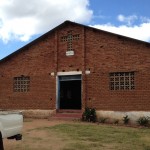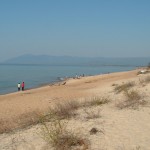
Area 24 Baptist Church, Lilongwe
Language is a funny thing. Even with fellow English speakers, the definition of words can cause confusion and misunderstanding. Living in a country where English is not the first language, nor indeed is taught in any serious way until someone goes to secondary school (which is not a legal requirement), can cause misunderstanding and confusion when trying to communicate as part of normal day life or in work situations.

A fuzzy photo of the interior of Area 24 Baptist Church, Lilongwe
I preached my first sermon in over six months last Sunday morning. I was invited to speak at a newly started English service for Area 24 Baptist Church in Lilongwe. There were about 30 people in the congregation, all of whom use English on a daily basis in their places of work. I did my best in trying to make illustrations culturally contextualised, but I am sure that there was still misunderstanding either by my turn of phrase or my colloquial Northern Irish accent!
After this service both Pamela and I had been invited to speak at a youth meeting. We arrived at the school grounds were the meeting was taking place at 1.00pm. People hadn’t had lunch yet, so we waited until lunch was over and then the meeting started. One key bit of information had got lost in translation. We had assumed that the youth group would be English speakers, that is, as young people they would have attended secondary school and have a grasp of the language. When a vote was taken whether to have the talk delivered straight in English or with a Chichewa translator, it was agreed to go with the translator.

The school building in Lilongwe where the local Baptist youth groups met on Sunday 27 April 2014
I have no issues atall with a talk being communicated in a local language, but it does change how you write and present a talk. So, off we went with stops and starts as English phrases where reorganised so that they could be understood by our translator and as we gathered our thoughts following an English statement being said, then translated, and then to the next English statement.
I think we got there in the end without too many linguistic casualties along the way! But this was a valuable lesson for us. Although we have been engaged in language study, we are nowhere near the point of being able to give a talk or speak without translation preparation. This youth meeting, as encouraging as the young people were, taught us that we need to take language learning more seriously so that the gospel message we desire to communicate through our work can be communicated effectively.
The events of the day of Pentecost must have been quite something with everyone hearing and understanding the apostles’ message in their own language.
Now there were dwelling in Jerusalem Jews, devout men from every nation under heaven. And at this sound the multitude came together, and they were bewildered, because each one was hearing them speak in his own language. And they were amazed and astonished, saying, “Are not all these who are speaking Galileans? And how is it that we hear, each of us in his own native language? Parthians and Medes and Elamites and residents of Mesopotamia, Judea and Cappadocia, Pontus and Asia, Phrygia and Pamphylia, Egypt and the parts of Libya belonging to Cyrene, and visitors from Rome, both Jews and proselytes, Cretans and Arabians—we hear them telling in our own tongues the mighty works of God.” And all were amazed and perplexed, saying to one another, “What does this mean?” But others mocking said, “They are filled with new wine.”
Acts 2: 5-13 (ESV)
Communicating in the mother tongue language is important when sharing the good news of Jesus Christ. It means that the meaning of the message has greater impact and leaves less room for misunderstandings. Please be in prayer for us as we take language learning more seriously so that God’s name can be glorified in the work he has called us to do.

The Baptist youth meeting on Sunday 27 April 2014 in Lilongwe



